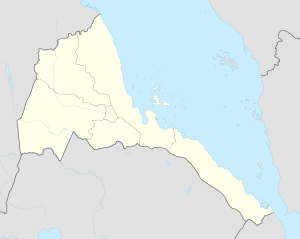Aligider
ዓሊግድር ዓሊ ግድር Ali Ghider, Ali-Guider, Alighedir | |
|---|---|
| Ali Ghider | |
| Coordinates: 15°07′N 36°29′E / 15.117°N 36.483°E | |
| Country | |
| Region | ጋሽ-ባርካ |
| District | ተሰነይ District |
| Area code | 291 |
Ali Ghider (Arabic: علي قدر) is located nine kilometers to the west of Teseney in the country of Eritrea. It is part of the Teseney sub-zone and has a diverse population.[1] It is considered the last settlement in Eritrea before reaching the Sudanese Border[2] and is located in the lowlands.[3]
Agriculture, livestock raising, and trade are vital to the area's economy. Ali Ghider has access to potable water from both the Gash River and underground water resources.[1] The irrigation process has created an artificial marsh near the Gash River, which provides a large habitat for many bird species.[4]
Ali Ghider was once an Italian frontier village.[5] Ali Ghider was an agricultural area that grew cotton and other crops, including sorghum, millet, and taff, and was managed by the Societa Impresse Africana (SIA). [6] SIA helped develop Ali Ghider into a company town, housing tenant farmers and other workers on the plantation.[6] A school and clinic were set up, and by the 1950s, the plantation employed 2,000 Eritreans and 15 Italians and "provided a residence for another 12,000 part-time workers and family members."[6]
A well-known Italian business that was established for many years in Ali Ghider was the Barattolo cotton plantation, which was established in 1965 by Roberto Barattolo in a purchase from SIA.[7] This acquisition from the SIA allowed Barattolo to export knitwear to Europe and the Middle East.[6]
Ali Ghider received significant damage from the sacking by Ethiopian forces.[2] Many of the Italian artifacts left from its time as a frontier village were destroyed in 2001 through Ethiopian military actions.[5]
15°07′00″N 36°29′00″E / 15.11667°N 36.48333°E
References
- ^ a b Ghebrehiwet, Kesete (15 June 2012). "Teseney Sub-Zone: Economic, Agricultural and Multi-Cultural Hub". Eritrea - Ministry of Information. Retrieved 8 July 2015.
- ^ a b Denison, Edward (2007). Eritrea (4th ed.). Guilford, Connecticut: Bradt Travel Guides. pp. 216–217. ISBN 978-1-84162-171-5.
- ^ Mehreteab, Amanuel (2004). Wake Up, Hanna!: Reintegration and Reconstruction Challenges for Post-War Eritrea. Lawrenceville, New Jersey: The Red Sea Press, Inc. p. 98. ISBN 1-56902-192-9.
- ^ "Important Bird and Biodiversity Areas". Bird Life International. 2001. Retrieved 8 July 2015.
- ^ a b "Tessenei Eritrea". Etritrea. Retrieved 8 July 2015.
- ^ a b c d Connell, Dan; Killion, Tom (2011). Historical Dictionary of Eritrea (2nd ed.). Lanham, Maryland: Scarecrow Press, Inc. pp. 62–64, 115. ISBN 978-0-8108-7505-0.
- ^ "Roberto Barattolo and the Eritrean Textile Industry". Dolce Vita: The Italian Lifestyle. Retrieved 8 July 2015.

